Mengzhang Cai
ChartVerse: Scaling Chart Reasoning via Reliable Programmatic Synthesis from Scratch
Jan 20, 2026Abstract:Chart reasoning is a critical capability for Vision Language Models (VLMs). However, the development of open-source models is severely hindered by the lack of high-quality training data. Existing datasets suffer from a dual challenge: synthetic charts are often simplistic and repetitive, while the associated QA pairs are prone to hallucinations and lack the reasoning depth required for complex tasks. To bridge this gap, we propose ChartVerse, a scalable framework designed to synthesize complex charts and reliable reasoning data from scratch. (1) To address the bottleneck of simple patterns, we first introduce Rollout Posterior Entropy (RPE), a novel metric that quantifies chart complexity. Guided by RPE, we develop complexity-aware chart coder to autonomously synthesize diverse, high-complexity charts via executable programs. (2) To guarantee reasoning rigor, we develop truth-anchored inverse QA synthesis. Diverging from standard generation, we adopt an answer-first paradigm: we extract deterministic answers directly from the source code, generate questions conditional on these anchors, and enforce strict consistency verification. To further elevate difficulty and reasoning depth, we filter samples based on model fail-rate and distill high-quality Chain-of-Thought (CoT) reasoning. We curate ChartVerse-SFT-600K and ChartVerse-RL-40K using Qwen3-VL-30B-A3B-Thinking as the teacher. Experimental results demonstrate that ChartVerse-8B achieves state-of-the-art performance, notably surpassing its teacher and rivaling the stronger Qwen3-VL-32B-Thinking.
OpenDataArena: A Fair and Open Arena for Benchmarking Post-Training Dataset Value
Dec 16, 2025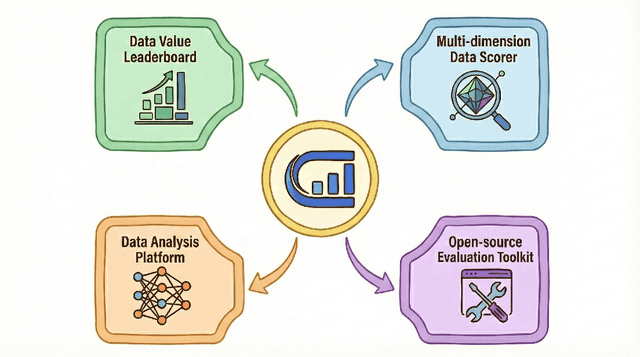
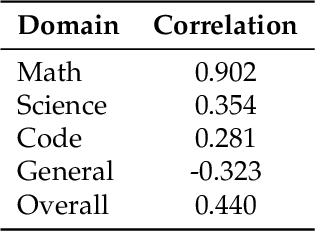
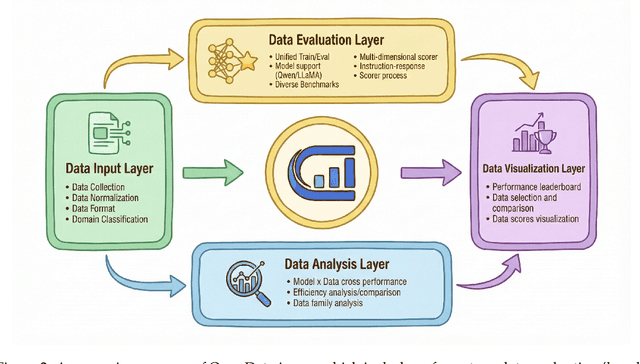

Abstract:The rapid evolution of Large Language Models (LLMs) is predicated on the quality and diversity of post-training datasets. However, a critical dichotomy persists: while models are rigorously benchmarked, the data fueling them remains a black box--characterized by opaque composition, uncertain provenance, and a lack of systematic evaluation. This opacity hinders reproducibility and obscures the causal link between data characteristics and model behaviors. To bridge this gap, we introduce OpenDataArena (ODA), a holistic and open platform designed to benchmark the intrinsic value of post-training data. ODA establishes a comprehensive ecosystem comprising four key pillars: (i) a unified training-evaluation pipeline that ensures fair, open comparisons across diverse models (e.g., Llama, Qwen) and domains; (ii) a multi-dimensional scoring framework that profiles data quality along tens of distinct axes; (iii) an interactive data lineage explorer to visualize dataset genealogy and dissect component sources; and (iv) a fully open-source toolkit for training, evaluation, and scoring to foster data research. Extensive experiments on ODA--covering over 120 training datasets across multiple domains on 22 benchmarks, validated by more than 600 training runs and 40 million processed data points--reveal non-trivial insights. Our analysis uncovers the inherent trade-offs between data complexity and task performance, identifies redundancy in popular benchmarks through lineage tracing, and maps the genealogical relationships across datasets. We release all results, tools, and configurations to democratize access to high-quality data evaluation. Rather than merely expanding a leaderboard, ODA envisions a shift from trial-and-error data curation to a principled science of Data-Centric AI, paving the way for rigorous studies on data mixing laws and the strategic composition of foundation models.
Middo: Model-Informed Dynamic Data Optimization for Enhanced LLM Fine-Tuning via Closed-Loop Learning
Aug 29, 2025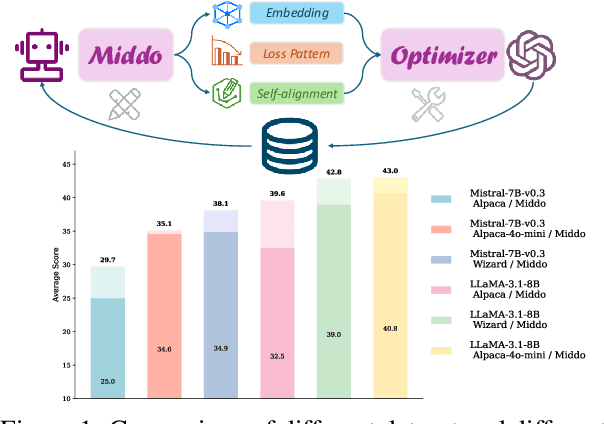
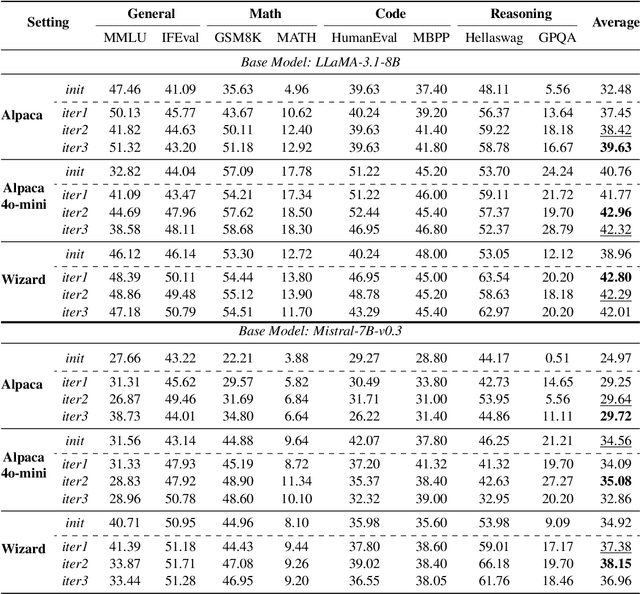
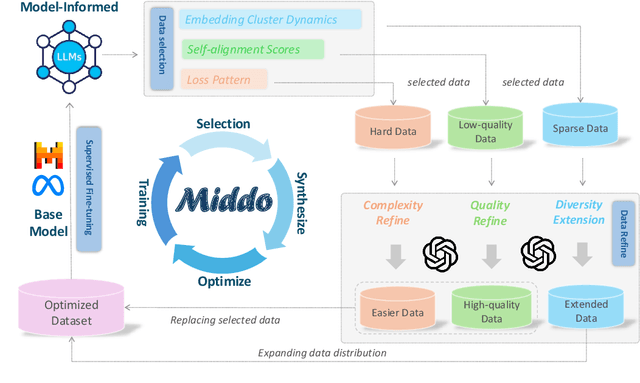
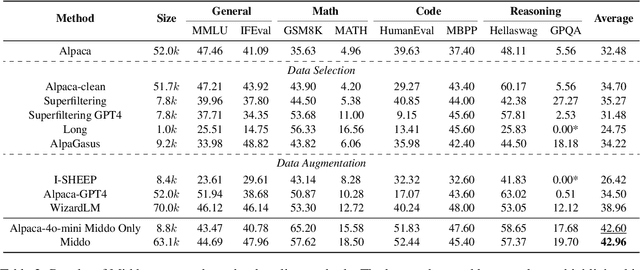
Abstract:Supervised Fine-Tuning (SFT) Large Language Models (LLM) fundamentally rely on high-quality training data. While data selection and data synthesis are two common strategies to improve data quality, existing approaches often face limitations in static dataset curation that fail to adapt to evolving model capabilities. In this paper, we introduce Middo, a self-evolving Model-informed dynamic data optimization framework that uses model-aware data selection and context-preserving data refinement. Unlike conventional one-off filtering/synthesis methods, our framework establishes a closed-loop optimization system: (1) A self-referential diagnostic module proactively identifies suboptimal samples through tri-axial model signals - loss patterns (complexity), embedding cluster dynamics (diversity), and self-alignment scores (quality); (2) An adaptive optimization engine then transforms suboptimal samples into pedagogically valuable training points while preserving semantic integrity; (3) This optimization process continuously evolves with model capability through dynamic learning principles. Experiments on multiple benchmarks demonstrate that our \method consistently enhances the quality of seed data and boosts LLM's performance with improving accuracy by 7.15% on average while maintaining the original dataset scale. This work establishes a new paradigm for sustainable LLM training through dynamic human-AI co-evolution of data and models. Our datasets, models, and code are coming soon.
IDEAL: Data Equilibrium Adaptation for Multi-Capability Language Model Alignment
May 19, 2025



Abstract:Large Language Models (LLMs) have achieved impressive performance through Supervised Fine-tuning (SFT) on diverse instructional datasets. When training on multiple capabilities simultaneously, the mixture training dataset, governed by volumes of data from different domains, is a critical factor that directly impacts the final model's performance. Unlike many studies that focus on enhancing the quality of training datasets through data selection methods, few works explore the intricate relationship between the compositional quantity of mixture training datasets and the emergent capabilities of LLMs. Given the availability of a high-quality multi-domain training dataset, understanding the impact of data from each domain on the model's overall capabilities is crucial for preparing SFT data and training a well-balanced model that performs effectively across diverse domains. In this work, we introduce IDEAL, an innovative data equilibrium adaptation framework designed to effectively optimize volumes of data from different domains within mixture SFT datasets, thereby enhancing the model's alignment and performance across multiple capabilities. IDEAL employs a gradient-based approach to iteratively refine the training data distribution, dynamically adjusting the volumes of domain-specific data based on their impact on downstream task performance. By leveraging this adaptive mechanism, IDEAL ensures a balanced dataset composition, enabling the model to achieve robust generalization and consistent proficiency across diverse tasks. Experiments across different capabilities demonstrate that IDEAL outperforms conventional uniform data allocation strategies, achieving a comprehensive improvement of approximately 7% in multi-task evaluation scores.
MetaLadder: Ascending Mathematical Solution Quality via Analogical-Problem Reasoning Transfer
Mar 19, 2025Abstract:Large Language Models (LLMs) have demonstrated promising capabilities in solving mathematical reasoning tasks, leveraging Chain-of-Thought (CoT) data as a vital component in guiding answer generation. Current paradigms typically generate CoT and answers directly for a given problem, diverging from human problem-solving strategies to some extent. Humans often solve problems by recalling analogous cases and leveraging their solutions to reason about the current task. Inspired by this cognitive process, we propose \textbf{MetaLadder}, a novel framework that explicitly prompts LLMs to recall and reflect on meta-problems, those structurally or semantically analogous problems, alongside their CoT solutions before addressing the target problem. Additionally, we introduce a problem-restating mechanism to enhance the model's comprehension of the target problem by regenerating the original question, which further improves reasoning accuracy. Therefore, the model can achieve reasoning transfer from analogical problems, mimicking human-like "learning from examples" and generalization abilities. Extensive experiments on mathematical benchmarks demonstrate that our MetaLadder significantly boosts LLMs' problem-solving accuracy, largely outperforming standard CoT-based methods (\textbf{10.3\%} accuracy gain) and other methods. Our code and data has been released at https://github.com/LHL3341/MetaLadder.
Inspector: Pixel-Based Automated Game Testing via Exploration, Detection, and Investigation
Jul 18, 2022



Abstract:Deep reinforcement learning (DRL) has attracted much attention in automated game testing. Early attempts rely on game internal information for game space exploration, thus requiring deep integration with games, which is inconvenient for practical applications. In this work, we propose using only screenshots/pixels as input for automated game testing and build a general game testing agent, Inspector, that can be easily applied to different games without deep integration with games. In addition to covering all game space for testing, our agent tries to take human-like behaviors to interact with key objects in a game, since some bugs usually happen in player-object interactions. Inspector is based on purely pixel inputs and comprises three key modules: game space explorer, key object detector, and human-like object investigator. Game space explorer aims to explore the whole game space by using a curiosity-based reward function with pixel inputs. Key object detector aims to detect key objects in a game, based on a small number of labeled screenshots. Human-like object investigator aims to mimic human behaviors for investigating key objects via imitation learning. We conduct experiments on two popular video games: Shooter Game and Action RPG Game. Experiment results demonstrate the effectiveness of Inspector in exploring game space, detecting key objects, and investigating objects. Moreover, Inspector successfully discovers two potential bugs in those two games. The demo video of Inspector is available at https://github.com/Inspector-GameTesting/Inspector-GameTesting.
 Add to Chrome
Add to Chrome Add to Firefox
Add to Firefox Add to Edge
Add to Edge